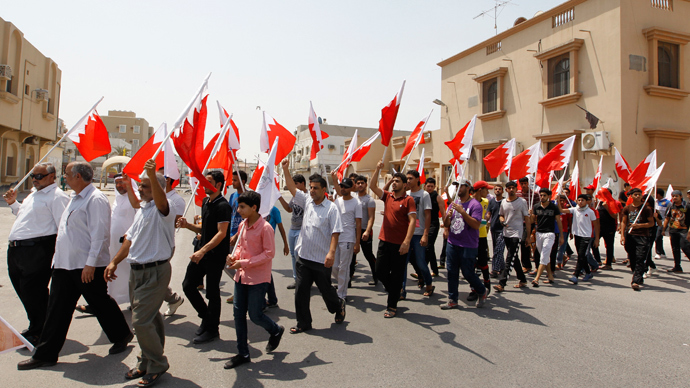Bahrain protests: Will the house of Khalifa fall like a house of cards?

Mass protests in Bahrain are by no means a sectarian conflict, though they threaten to further entrench political polarization and serve as an ugly thorn in the Bahraini monarchy’s side unless they hear the popular calls for constitutional reform.
Despite Bahraini PM Sheikh al-Khalifa’s warning to pro-democracy
activists that they face longer prison sentences and the
stripping of their citizenship if they take part in August 14’s
scheduled opposition rally, protesters are expected to take to
the streets en masse.
The tiny island nation has seen near-daily protests and
skirmishes between demonstrators and security forces since the
regional Arab Spring protests in 2011, and the US-allied monarchy
has responded with draconian measures that ban public
demonstrations in the capital, Manama. The ongoing protest
movement, which has been secular and largely peaceful, brought
more than half the country’s 535,000 citizens onto the streets at
its peak, but attracted minimal levels of attention from
international media outlets. The scant coverage of the subsequent
crackdown by Bahraini authorities, which included the military
occupation of a public hospital and the arrest of doctors who
treated injured protesters, has led many to suggest that Western
and Gulf media outlets have been complicit in the monarchy’s
efforts to suppress news of protests coming out of the country.
The brute heavy-handedness of the monarchy, which led to the
deaths of some 80 people since 2011, may have driven people into
their homes and discouraged them from speaking out, but public
animosity toward the reactionary regime shows no sign of letting
up.
The 229-year-old royal dynasty was so shaken to its core by the
groundswell of Arab Spring protests that it declared an
11-week-long period of martial law, and called upon Saudi Arabia
to militarily intervene under the banner of the GCC Peninsula
Shield Force, which sent 1,500 troops into Bahrain to crush the
pro-democracy rallies.
Reports issued by the US State Department, as well as Bahrain’s own Independent Commission of Inquiry – commissioned by King Hamad Khalifa – confirm that peaceful protesters were subjected to unwarranted detention and torture while in custody . To get an idea of just what kind of regime this is, reports also indicate that members of the royal family directly took part in torturing activists. Protesters have reportedly cited the recent toppling of Mohamad Morsi in Egypt as a source of inspiration for the August 14 rally, which merits a closer look at the two main lines of thinking among Bahrain’s opposition.
Constitutional monarchy vs. Republic
Worsening social and political conditions have fuelled the
momentum for change, and while the royal establishment owns some
$40 billion in public assets and lives in grandeur, the majority
of the population face a stagnate economic climate with limited
job opportunities.
Around 70 percent of the population follows the Shia sect of
Islam, while the royalty are minority Sunnis, and much like other
Arab Spring protests, the youth that took to the streets are
Internet-savvy, largely unaffiliated to political parties, and
evenly composed of both Shia and Sunnis despite the monarchy’s
assertions that the demonstrations were a seditious Shia plot to
grab power.
The opposition body with the highest levels of public support is the al-Wifaq National Islamic Society, which controls 17 out of 40 seats in the Bahraini parliament (the lower half of parliament is elected while the King appoints the upper half.) Al-Wifaq seeks to adopt a new constitution that would transform Bahrain into a constitutional monarchy that elects its decision makers by the ballot box, and although the leaders of the group are Shia, both Sunni and Shia, along with men and women from all walks of life have supported the group.
Alternatively, the Coalition for a Republic aims to totally dismantle the royal hereditary establishment and install a republic, which is much less likely to happen given the regime’s monopoly over the use of force.
What both blocs have in common is the desire to restructure the
long existing sectarian political arrangement that allows the
Shia majority to be ruled by the Sunni minority.
However, this is by no means a sectarian conflict on the ground,
in fact it is much to the contrary. Protesters have popularly
rejected sectarian divisions and many Sunnis have also taken part
in demonstrations – common Bahraini national identity is a more
significant unifying factor among the people.
Though sectarian differences are not a huge factor in streets, much of the Shia majority have fallen victim to a two-tier citizenship system that gives Sunnis preferential treatment in terms of employment, allowing them to ascend the economic ladder with greater ease. The monarchy has taken advantage of the protests to crack down on Shia clerics and destroy dozens of Shia places of worship, which has been met with acquiescence in the West due to the US-educated King Hamad playing up the ‘Iranian threat’.

King Hamad’s geopolitical trump card
The way the United States makes its foreign policy decisions has
a lot to do with where each individual country stands on the
question of US dominance: countries that oppose a US military
presence on their territory and reject the unregulated brand of
capitalism espoused by Washington will likely see their human
rights abuses make headlines, and their leaders characterized in
a derogatory way. Countries that do their part to enable US
interests and acquiesce to the Washington consensus, meanwhile,
are usually given immunity when they commit human rights abuses,
and protection from being toppled.
King Hamad knows the rules of the game, and he’s playing them well – the next-in-line “reformist” Crown Prince Salman bin Issa has already taken the initiative by championing the normalization of ties with Israel. Bahrain hosts the headquarters of the US Fifth Fleet, has a free trade agreement with the US, and is a vital geopolitical access point and oil transit hub that Washington isn’t going to risk losing. The main reason the Western media has been so quiet about Bahrain is because a new regime would engender huge strategic risks for Washington and the entire GCC.
The main fear is that if the al-Wifaq National Islamic Society or
any other Shi’a majority body came to power, Bahrain would drift
into Iran’s orbit, thereby undermining the Sunni-monarchies in
the GCC and tilting the geopolitical balance of the region in
Tehran’s favor. Al-Wifaq’s spiritual leader, Ayatollah Sheikh
Issa Qassim, spent time studying in Iran’s holy city Qom and
there is little doubt that the Shia clerical establishment would
back Tehran if it gained greater influence over the political
direction of the country. Saudi Arabia, which has invested
billions into little Bahrain, isn’t going to let such a shift
take place. For royalty in the Persian Gulf, the anti-monarchy
Iranian Revolution is an anathema, and if one of the GCC
countries sent its monarchy packing, the fear is that it would
inspire a domino effect, especially in eastern Saudi Arabia’s
oil-rich Shia-majority province.
The irony is that while King Hamad and the royal establishment has been crying foul over covert Iranian attempts to destabilize the monarchy, Bahrain’s own Independent Commission of Inquiry report explicitly notes the lack of evidence to implicate Iran in fomenting or assisting any demonstrations that have taken place.
Learning from the past
Bahrain was rocked by similar protests throughout the 1990s; the aim at that time was the reinstatement of parliament, which had been dissolved since 1975, and the restoration of the national assembly. The reactionary monarchy sluggishly refused even the slightest modicum of reform, and ruled with impunity by subjecting any dissenters to indefinite detention. It was only until critical mass built that King Hamad, who was new at the time, made political reforms and eventually passed the National Action Charter, a document that returned the country to constitutional rule, modestly lifted the security apparatus, and allowed for members of the lower parliament to be elected.
The unexceptional series of reforms still granted absolute power
to the king, but they stabilized the country and satisfied the
people’s demands for a time. The current climate in Bahrain is
such that making popular reforms in-line with a constitutional
monarchy would actually be in the regime’s interests, because
continuing an unpopular political regime that the majority of
citizens reject will only threaten the economy and long-term
stability in the country. It would be great if hereditary rule
came to an end in Bahrain, but incremental moves toward a
constitutional monarchy is the only realistic direction that one
could expect. So far, there is no indication that the regime will
yield, and every reason to expect that the next wave of protests
will see unwarranted mass arrests, torture, and probably some
casualties – and Uncle Sam’s lips will be sealed.
The statements, views and opinions expressed in this column are solely those of the author and do not necessarily represent those of RT.
The statements, views and opinions expressed in this column are solely those of the author and do not necessarily represent those of RT.













